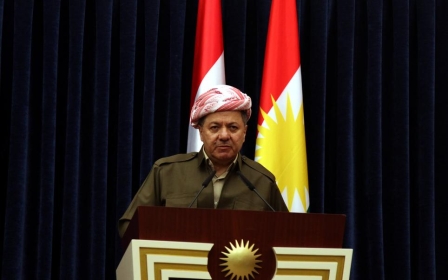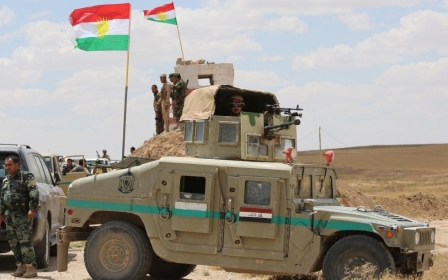Netanyahu calls for Jordan support, Kurdish independence

Israeli Prime Minister Benjamin Netanyahu asked the international community on Sunday to support Jordan in the fight against "Islamic extremism" and to back the independence of Iraq's Kurds.
"We need to support efforts by the international community to strengthen Jordan and support the aspirations of the Kurds for independence," Netanyahu said in a speech to the Institute of National Security Studies think-tank in Tel Aviv.
"I think it's our common interest to make sure that a moderate, stable regime like (Jordan) is able to defend itself."
His remarks follow reports in Israeli media that officials in Tel Aviv fear Islamic State of Iraq and the Levant (ISIL) - rebranded on Sunday as simply 'the Islamic State' (IS) - may extend its control to areas of Jordan after seizing parts of Iraq in recent weeks.
In Syria, IS's fighters already control large swathes of territory in Deir Ezzor near the Iraq border, Raqqa in the north, as well as parts of neighbouring Aleppo province.
In Iraq, they have spearheaded a lightning offensive, capturing sizeable territories in the north and west of the conflict-torn country.
Netanyahu also called for independence for Iraq's Kurdistan region, where Kurdish peshmerga security forces have mobilised in an unprecedented deployment to fight against IS.
The premier voiced concern over "the powerful wave triggered by ISIL (IS), which could reach Jordan in a very short time."
He added: "We must be able to stop the terrorism and fundamentalism that can reach us from the east at the Jordan line and not in the suburbs of Tel Aviv."
The Kurds already have their own autonomous region in the north and have taken over key towns outside this area after federal forces withdrew in the face of advancing militants.
Iraqi Kurdish leader Massoud Barzani said last week that there was no going back on autonomous Kurdish rule in oil city Kirkuk and other towns now captured by Kurdish fighters.
Israeli experts expect Tel Aviv to be quick to recognise a future Kurdish state, and Israel is thought to have maintained discreet military, intelligence and business ties with the Kurds since 1960s.
US Secretary of State John Kerry hosted talks with Gulf allies and Jordan last week, emphasising the Hashemite kingdom's key role in helping to stem the regional gains of ISIL, who had earlier seized control of a Jordanian border crossing in Iraq.
IS on Sunday declared it had established a "caliphate", or Islamist state, straddling Iraq and Syria. The jihadists said the state would spread from Aleppo in northern Syria to Diyala in eastern Iraq, ordering Muslims in those areas to pay allegiance to the group.
New MEE newsletter: Jerusalem Dispatch
Sign up to get the latest insights and analysis on Israel-Palestine, alongside Turkey Unpacked and other MEE newsletters
Middle East Eye delivers independent and unrivalled coverage and analysis of the Middle East, North Africa and beyond. To learn more about republishing this content and the associated fees, please fill out this form. More about MEE can be found here.




